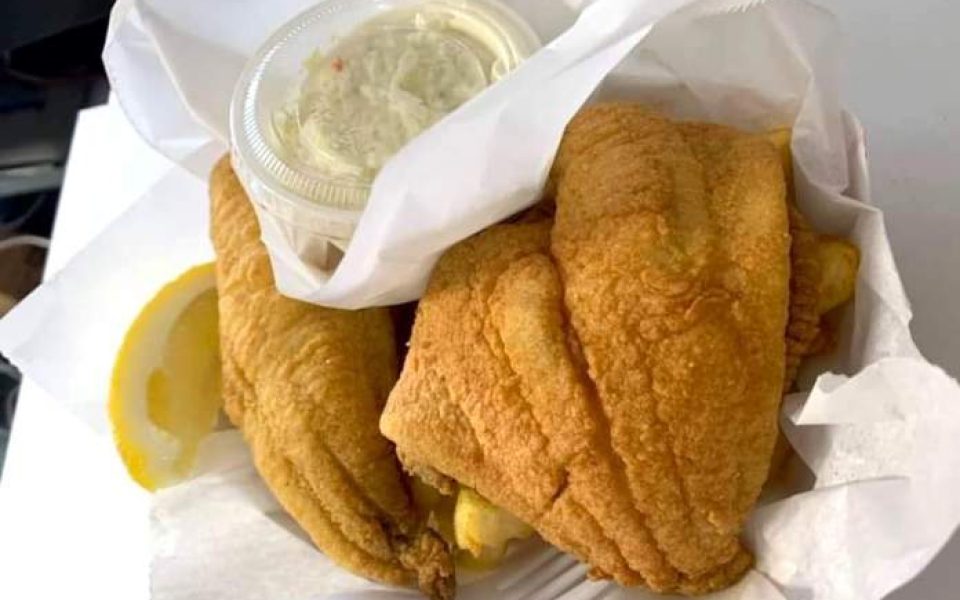After announcing my engagement to my first husband, I found my family planning a fish fry for the next night. Aunts, uncles, cousins and family friends descended upon my childhood home to welcome my fiancé to the fold. Overnight, dozens of pounds of fish were procured, cabbage was shredded for coleslaw and lemons sliced for adding to sweet tea and squeezing over the cornmeal-crusted vertebrates. It was a homecoming to celebrate the joining of our families.
The Greatest Homecoming on Earth — or GHOE, for alumni, students, friends and family of NC A&T University — encompasses the same feeling. Almost overnight, the population of east Greensboro grows exponentially, as cookouts, fish-frys and tailgate set-ups dot the campus — indeed, the entire neighborhood — before the big game.
While the fish fry is not a uniquely black experience, the tradition of the fish plate took on a new meaning during the Reconstruction and Jim Crow eras. Fish was easy to obtain, cook and utilize as a fundraiser for churches, schools, civic organizations and other small enterprises.
On the surface, the fish fry is a simple gathering exalting the joy of fried fish.
Doused with hot sauce, next to slices of white bread alongside various side dishes, the tradition has deep roots, and special meaning at GHOE.
When black kids go to college, the first three things they need to find after moving into the dorm are a church, a beauty salon or barbershop, and a fish house. These social constructs serve a higher purpose, to connect family from the African diaspora and to offer a thread of continuity during a life change. All three places are integral to melding home life with a new collegiate life and fostering community within a microcosm of the world.
“For me it’s all about the nostalgia,” says NC A&T alum Natasha Gore (Class of ’00). “Not only does eating at GHOE remind me of my time in college, but it also reminds me of family reunions, church events, summers spent with my grandparents in South Carolina.”
She says it evokes everything that is amazing and uplifting that comes along with being black in South.
Setting up tents, grills, fryers, tables, chairs and coolers full of food, ice, and beverages takes a village. Alum Alfred Shaw (Class of ’98) knows firsthand about how all-encompassing the experience can be. His village is a group of friends from his days on campus who have kept in touch over the years. Most are like brothers and sisters, with a bond that is only strengthened during GHOE.
“It’s an intangible feeling,” he says. “The amount of pride present and the fact that it’s an HBCU. That experience alone cannot be matched anywhere else.”
The village starts setting up around 5:30 the morning of the homecoming game. Shaw and 15 of his friends and other alums hail from Georgia, Virginia, Washington DC, Houston and other parts of North Carolina. Their tailgate moniker: “The Aggnificent Tailgate.” The day’s menu reads like a course catalog: fried chicken wings, French fries, fried shrimp, grits, pork shoulder, shredded brisket, mac and cheese, cole slaw, potato salad, baked beans, green beans with smoked turkey, dirty rice, fried ribs, and hot dogs and hamburgers. And the fish? Flounder filets, fried hard with cornmeal and flour-meal crusts.
“And more,” Shaw adds. A finite number of wristbands will be distributed to friends, family and other tailgate participants in order to control the flow of food. The plate turns into a tailgate that everyone will remember and none will soon forget.
Gore approaches GHOE eats differently.
“The tailgate for me is unpredictable, since I didn’t have a dedicated crew in college,” she says. “Mostly, I avoid the tailgate, unless I run into someone who has the hookup.”
She says the best places to grab a fish plate are pop-ups which are not necessarily repeats.
“Some of what you eat is novelty, much of what you eat is unhealthy, and all of what you eat invokes the sweetest of memories.”
Find your GHOE fish plate where you can get it. Tailgate etiquette dictates that greeting, “Hey, that smells good,” can be passable for entry.
Join the First Amendment Society, a membership that goes directly to funding TCB‘s newsroom.
We believe that reporting can save the world.
The TCB First Amendment Society recognizes the vital role of a free, unfettered press with a bundling of local experiences designed to build community, and unique engagements with our newsroom that will help you understand, and shape, local journalism’s critical role in uplifting the people in our cities.
All revenue goes directly into the newsroom as reporters’ salaries and freelance commissions.


Leave a Reply